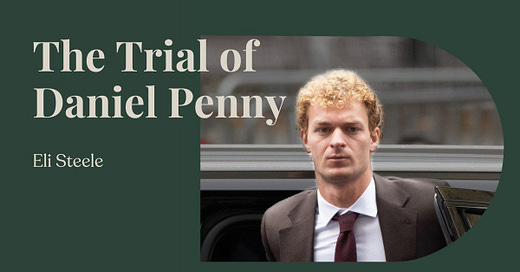The Trial of Daniel Penny
Perhaps the most damaging aspect of Bragg’s racial-equity regime as Manhattan DA has been the perception of racial unfairness it created in one of America’s most racially diverse cities.
Good morning,
I hope you all are getting ready for the holidays and some relaxing time.
Thank you for your response to the Magic, Bird & Caitlin Clark piece. I enjoyed reading your emails as well the comments. I originally thought the piece was too long for X, but decided to post it anyway yesterday. It went viral — over 1.1 million views now. Here’s the link to the thread.
As most of you know, I posted this piece, O.J. Simpson and the Daniel Penny Case, about ten days ago. A week ago, one of my favorite publications, Quillette Magazine, asked me to do a deeper and more definitive piece on the trial.
It was an honor to do so and I hope you can give it a read - link here. Here’s a short snippet:
On 4 May, just three days after Jordan Neely died, the New York Times published an op-ed by Roxanne Gay under the tendentious headline, “Making People Uncomfortable Can Now Get You Killed.” There was, Gay wrote, “no patience for simple mistakes or room for addressing how bigotry colors even the most innocuous interactions,” and she reproached Americans for allowing themselves to become “a people without empathy, without any respect for the sanctity of life unless it’s our own.” Daniel Penny’s identity and most key facts of the case were not yet known, but Gay had already decided that Penny was a racist and that his fellow passengers should feel ashamed of the discomfort Neely’s aggressive behaviour had caused them…
Before a racially mixed jury of seven women and five men, prosecutor Yoran pursued a similar line of reasoning. In her opening statement, she allowed that “the defendant did not intend to kill him. His initial intent was even laudable.” But that charitable sentiment was short-lived, and Yoran’s rhetoric soon slipped into the kind of activist sloganeering for which her office has become notorious. Daniel Penny, she told the jury, did not believe that Neely deserved “even the minimum modicum of humanity.” And Neely, she contended, wanted nothing more than “to be seen.” Defence attorney Thomas Kenniff replied that Penny had been motivated by a “protect thy neighbor” ethic, not racial animus. “This is a case,” he said, “about a young man who did for others what we would want someone to do for us. It doesn’t make him a hero, but it doesn’t make him a killer.”
As the trial proceeded, it became clear that Penny’s character would play an equal or even more important role than the actual incident. Yoran continued to push a narrative of callous inhumanity with racist overtones. She called witnesses to the stand who referred to Penny as a “murderer” and as the “white man.” The defence objected to this kind of language and asked for a mistrial, but their request was denied. They called several character witnesses to testify on Penny’s behalf. An active duty Marine, Gunnery Sgt. Nathaniel Dunchie, said that “discrimination is not tolerated in the Marine Corps” and that Penny was a temperamentally peaceful man of integrity and honesty. Another Marine, Platoon Sgt. Nolan Drylie, now an Alabama farmer, testified that Penny received a Humanitarian Service medal in 2018 for helping victims of Hurricane Florence.
Yoran pressed ahead with her portrait of a vindictive racist, regardless. A black man was dead, and she was the humanitarian in this trial with compassion and even history on her side. But throughout the trial, she was unable to acknowledge what psychologist Abraham Maslow has described as one of the most basic human needs: safety. Neely’s behaviour did not merely cause Penny and the other subway passengers “discomfort”—a relatively trivial concern. What Neely’s behaviour actually provoked was an overwhelming and primitive need for self-preservation that outweighed every other consideration. Why else would a teenager place a 911 call within thirty seconds of Neely boarding the train?
Again, the link to the full article.
Thank you again for your support and all of your comments — truly appreciate them.
All my best,
Eli




👏 Bravo! Just Excellent!
Thanks again Eli for your chosen words of wisdom and perspective that crosses the old, tired use of the 'race card' to address any issue when the accused is white and the perpetrator is black. The prosecutor's office in NYC needs to review what exactly justice is.